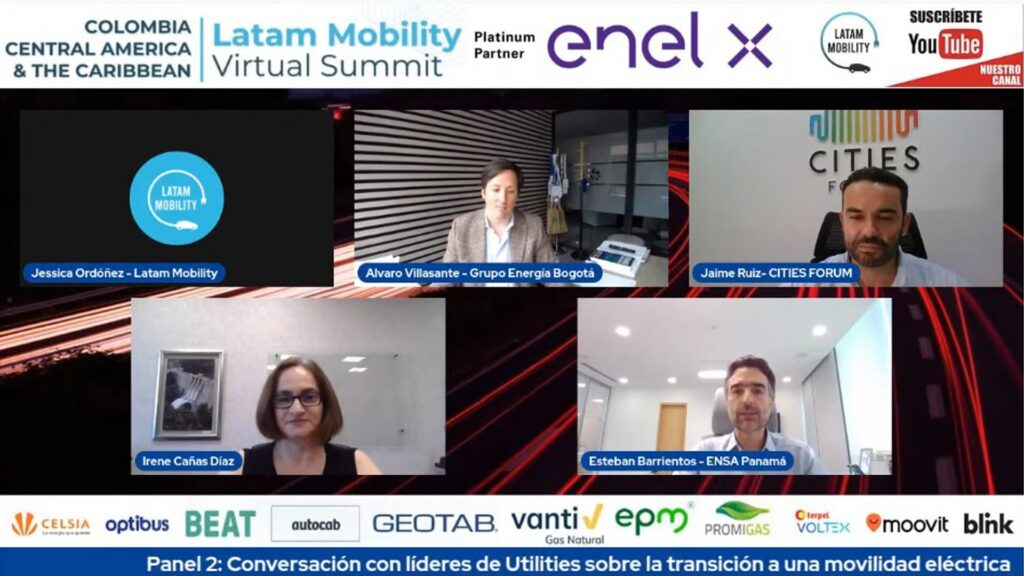
Villasante from Grupo Energía Bogotá: “It is a challenge to see mobility behavior, you have to understand consumers to achieve positive results”

Latin America is prepared for changes towards electric mobility, with increasingly robust charging infrastructure networks and key alliances between the public and private sectors.
The Latin American Sustainable Mobility Summit, Colombia, Central America and the Caribbean edition, organized by Latam Mobility, was the scene for Utilities leaders in the region to offer their perspectives on the topic: “The transition to electric mobility”, a debate that was moderated by the co-founder of Cities Forum, Jaime Ruiz Huescar.
Alvaro Villasante, Vice President of Business Management and Innovation at Grupo Energía Bogotá, highlighted that it is essential to strengthen alliances between all the players in the sector to promote the transition to sustainable mobility in a more agile and accelerated way.
“Mobility is undergoing a great transformation. There are companies that are making a great effort to promote changes in areas such as public transport and provide many facilities to the user,” he said.
Villasante assured that citizens are increasingly interested in sustainable means of transport. “There is a great positive change, people want to switch to sustainable options. We are ‘evangelizing’ because people want to change to clean mobility, this is going to be a representative line in our companies and the strategic plans include the transformation of large cities.”
The search for decarbonization
The Grupo Energía Bogotá executive revealed that they are actively working in Brazil, Peru, Colombia and Guatemala with a focus on electric mobility. In addition, he pointed out that they work with gas in freight and bus transportation in the region.
According to Villasante, it is vital to work on the issue of the energy matrix to guarantee clean transportation, and he informed that they are making heavy investments in data analytics and mobility solutions. “It is a challenge to see mobility behavior, you have to understand consumers to achieve positive results.”
Esteban Barrientos CEO of Ensa (Grupo EPM) explained that the company is responsible for 45% of the Panamanian distribution market, by developing all value-added mobility services. “We have many challenges; we have worked with the government and the ecosystem in general so that Panama becomes a pillar of this transformation.”
Among the projects being carried out by the company he represents, he highlighted: “We are currently working with MiBus in Panama, a pilot plan with tests of an electric bus with passengers and real mobility to have an organized and monitored system that has had positive results.”
Likewise, he informed that they are working to a great extent with taxi drivers “creating financial and insurance conditions, all the necessary ecosystem and we are leading this development.”
“We bet heavily on the issue of buses and taxis as pillars of development strategy,” he said.
For her part, Irene Cañas Díaz, CEO of ICE, who has also served as Vice Minister of Energy and Environmental Management of Costa Rica, pointed out that they work hard on renewable energy and sustainable mobility issues, with the aim of providing solutions that lead to the reduction of emissions in the transport sector.
“We are focused on a pilot plan for electric buses from the German cooperative and we manage it and work on all the data. We are also supporting the government with the development of an electric passenger train. It has been a very interesting experience that has required efforts and cooperation,” she indicated.
In addition, the Costa Rican leader stated: “We see taxis as a niche in which we have to enter, eliminate myths and look for financing options. We are an active actor in the transition towards electric transportation with a 100 percent renewable matrix.”
Challenges in infrastructure and difficulties in the market
Utilities leaders agreed that Latin America is preparing successfully in terms of charging infrastructure, but still faces obstacles from the value chain
“We are being very proactive, the effort that is being made is impressive. It is a business commitment, we provide energy that will have a good line of business, but we do not do it specifically for that but society,” explained Villasante.
Cañas highlighted that: “In Costa Rica we are very ambitious in committing to the Paris climate agreement. We have several years of transition and when we approach the manufacturers they tell us no because there is no charging infrastructure to bet on bringing electric vehicles.”
“We already have a recharging network. However, we remain unattractive to manufacturers. There are many people interested here who need offers. Some are economically available to import, but many others are not. That is being the great challenge to expand the supply of electric vehicles,” he added.
Vital alliance between the actors
“When the decisions of the public sector go hand in hand with the private sector, everything works much more efficiently. When there is an incentive and laws, development is much greater,” said Villasante.
For Cañas Díaz of ICE, “everything goes through alliances to establish a great infrastructure network. Efforts must be focused on a single platform and a single application on cell phones so that the user knows where the nearest charger is.”
He explained that to set these goals, they work hand in hand with the Council of Public Transportation, the Ministry of Transportation and the Ministry of Environment and Energy of Costa Rica.
In the same vein, Barrientos de Ensa, stated: “We have been doing very hard work to get the laws we need removed, we are working with the deputies so that the business develops, we are also sitting with the energy secretary so that everything flows with the Assembly.”
“We must work more coordinated and integrated so that manufacturers take us seriously,” said Cañas Díaz. In addition, he reiterated that “we need regulation of transportation rates and electricity rates, all of this to promote electrical transportation.”
“We must not leave behind the whole issue of financing and laws that encourage the purchase and import of electric vehicles with tax exemption.”
Barrientos concluded by urging all sectors to work together so that brands see the region as an important market. “Very fast changes are coming. We are financially ready for investment. Society needs a radical change in the way we mobilize.”





